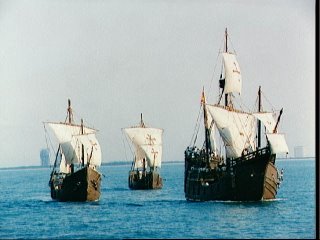Happy Columbus Day
Columbus Day is the annual U.S. commemoration of Christopher Columbus's landing in the New World (at San Salvador island, also known as Waitling Island, today part of the British Bahamas) on October 12, 1492. Columbus was not the first European successfully to cross the Atlantic. Viking sailors are believed to have established a short-lived settlement in Newfoundland sometime in the 11th Century, and scholars have argued for a number of other possible pre-Columbian landings. Columbus, however, initiated the lasting encounter between Europeans and the indigenous peoples of the Western Hemisphere. A number of nations celebrate this encounter with annual holidays: Discovery Day in the Bahamas, Hispanic Day in Spain, and Día de la Raza in much of Latin America. In 1971, Congress moved the U.S. holiday from October 12 to the second Monday in October, to afford workers a long holiday weekend. In the United States, Columbus Day is typically a celebration of Italian and Italian-American cultural heritage, Columbus generally being considered a native of Genoa.
Columbus, however, initiated the lasting encounter between Europeans and the indigenous peoples of the Western Hemisphere. A number of nations celebrate this encounter with annual holidays: Discovery Day in the Bahamas, Hispanic Day in Spain, and Día de la Raza in much of Latin America. In 1971, Congress moved the U.S. holiday from October 12 to the second Monday in October, to afford workers a long holiday weekend. In the United States, Columbus Day is typically a celebration of Italian and Italian-American cultural heritage, Columbus generally being considered a native of Genoa. In the late fifteenth century, Portuguese sailors dominated the effort to establish a sea route between Europe and India by circumnavigating Africa. It was with an eye toward outflanking the Portuguese that Isabella I of Spain authorized an expedition in which Columbus would sail west from Spain, aiming for India. This of course presumed that the world was round. Contrary to later popular belief, many educated people already understood this; Columbus' achievement rests instead in his success in persuading Isabella to finance a dangerous and speculative expedition. Columbus set sail with 90 men in August 1492 on three ships: the Santa Maria, the Nina and the Pinta. After sailing west for five weeks, they reached land on October 12. Columbus believed he had found a new route to India, hence the use of the word Indians to describe the peoples he met. Columbus would make three subsequent voyages and would die believing that he had found a new route to India and Asia, and not in fact the gateway to North and South America.
In the late fifteenth century, Portuguese sailors dominated the effort to establish a sea route between Europe and India by circumnavigating Africa. It was with an eye toward outflanking the Portuguese that Isabella I of Spain authorized an expedition in which Columbus would sail west from Spain, aiming for India. This of course presumed that the world was round. Contrary to later popular belief, many educated people already understood this; Columbus' achievement rests instead in his success in persuading Isabella to finance a dangerous and speculative expedition. Columbus set sail with 90 men in August 1492 on three ships: the Santa Maria, the Nina and the Pinta. After sailing west for five weeks, they reached land on October 12. Columbus believed he had found a new route to India, hence the use of the word Indians to describe the peoples he met. Columbus would make three subsequent voyages and would die believing that he had found a new route to India and Asia, and not in fact the gateway to North and South America. Because the United States evolved out of British colonization rather than the Spanish claims of Columbus and his successors, the U.S. for many years did not celebrate Columbus's "discovery," although ceremonies were held on the 300th and 400th anniversaries of his first landing. Two early celebrations also occurred in New York in 1866 and San Francisco in 1869. Italian immigrants were the first to celebrate the holiday annually in U.S. cities where they had settled in large numbers, in part as a celebration of their heritage, since Columbus was believed to be Italian. In 1937, President Franklin D. Roosevelt proclaimed Columbus Day a national holiday, then held every October 12 and now on the second Monday in October.
Because the United States evolved out of British colonization rather than the Spanish claims of Columbus and his successors, the U.S. for many years did not celebrate Columbus's "discovery," although ceremonies were held on the 300th and 400th anniversaries of his first landing. Two early celebrations also occurred in New York in 1866 and San Francisco in 1869. Italian immigrants were the first to celebrate the holiday annually in U.S. cities where they had settled in large numbers, in part as a celebration of their heritage, since Columbus was believed to be Italian. In 1937, President Franklin D. Roosevelt proclaimed Columbus Day a national holiday, then held every October 12 and now on the second Monday in October. U.S. federal government offices close on Columbus Day, as do most banks. Schools typically remain open, as do most American businesses. New York City continues to host a large and festive Columbus Day parade, over 500 years since the historic appearance of three ships off the coast of a small Caribbean island.
U.S. federal government offices close on Columbus Day, as do most banks. Schools typically remain open, as do most American businesses. New York City continues to host a large and festive Columbus Day parade, over 500 years since the historic appearance of three ships off the coast of a small Caribbean island.
 Columbus, however, initiated the lasting encounter between Europeans and the indigenous peoples of the Western Hemisphere. A number of nations celebrate this encounter with annual holidays: Discovery Day in the Bahamas, Hispanic Day in Spain, and Día de la Raza in much of Latin America. In 1971, Congress moved the U.S. holiday from October 12 to the second Monday in October, to afford workers a long holiday weekend. In the United States, Columbus Day is typically a celebration of Italian and Italian-American cultural heritage, Columbus generally being considered a native of Genoa.
Columbus, however, initiated the lasting encounter between Europeans and the indigenous peoples of the Western Hemisphere. A number of nations celebrate this encounter with annual holidays: Discovery Day in the Bahamas, Hispanic Day in Spain, and Día de la Raza in much of Latin America. In 1971, Congress moved the U.S. holiday from October 12 to the second Monday in October, to afford workers a long holiday weekend. In the United States, Columbus Day is typically a celebration of Italian and Italian-American cultural heritage, Columbus generally being considered a native of Genoa. In the late fifteenth century, Portuguese sailors dominated the effort to establish a sea route between Europe and India by circumnavigating Africa. It was with an eye toward outflanking the Portuguese that Isabella I of Spain authorized an expedition in which Columbus would sail west from Spain, aiming for India. This of course presumed that the world was round. Contrary to later popular belief, many educated people already understood this; Columbus' achievement rests instead in his success in persuading Isabella to finance a dangerous and speculative expedition. Columbus set sail with 90 men in August 1492 on three ships: the Santa Maria, the Nina and the Pinta. After sailing west for five weeks, they reached land on October 12. Columbus believed he had found a new route to India, hence the use of the word Indians to describe the peoples he met. Columbus would make three subsequent voyages and would die believing that he had found a new route to India and Asia, and not in fact the gateway to North and South America.
In the late fifteenth century, Portuguese sailors dominated the effort to establish a sea route between Europe and India by circumnavigating Africa. It was with an eye toward outflanking the Portuguese that Isabella I of Spain authorized an expedition in which Columbus would sail west from Spain, aiming for India. This of course presumed that the world was round. Contrary to later popular belief, many educated people already understood this; Columbus' achievement rests instead in his success in persuading Isabella to finance a dangerous and speculative expedition. Columbus set sail with 90 men in August 1492 on three ships: the Santa Maria, the Nina and the Pinta. After sailing west for five weeks, they reached land on October 12. Columbus believed he had found a new route to India, hence the use of the word Indians to describe the peoples he met. Columbus would make three subsequent voyages and would die believing that he had found a new route to India and Asia, and not in fact the gateway to North and South America. Because the United States evolved out of British colonization rather than the Spanish claims of Columbus and his successors, the U.S. for many years did not celebrate Columbus's "discovery," although ceremonies were held on the 300th and 400th anniversaries of his first landing. Two early celebrations also occurred in New York in 1866 and San Francisco in 1869. Italian immigrants were the first to celebrate the holiday annually in U.S. cities where they had settled in large numbers, in part as a celebration of their heritage, since Columbus was believed to be Italian. In 1937, President Franklin D. Roosevelt proclaimed Columbus Day a national holiday, then held every October 12 and now on the second Monday in October.
Because the United States evolved out of British colonization rather than the Spanish claims of Columbus and his successors, the U.S. for many years did not celebrate Columbus's "discovery," although ceremonies were held on the 300th and 400th anniversaries of his first landing. Two early celebrations also occurred in New York in 1866 and San Francisco in 1869. Italian immigrants were the first to celebrate the holiday annually in U.S. cities where they had settled in large numbers, in part as a celebration of their heritage, since Columbus was believed to be Italian. In 1937, President Franklin D. Roosevelt proclaimed Columbus Day a national holiday, then held every October 12 and now on the second Monday in October. U.S. federal government offices close on Columbus Day, as do most banks. Schools typically remain open, as do most American businesses. New York City continues to host a large and festive Columbus Day parade, over 500 years since the historic appearance of three ships off the coast of a small Caribbean island.
U.S. federal government offices close on Columbus Day, as do most banks. Schools typically remain open, as do most American businesses. New York City continues to host a large and festive Columbus Day parade, over 500 years since the historic appearance of three ships off the coast of a small Caribbean island.



















<< Home